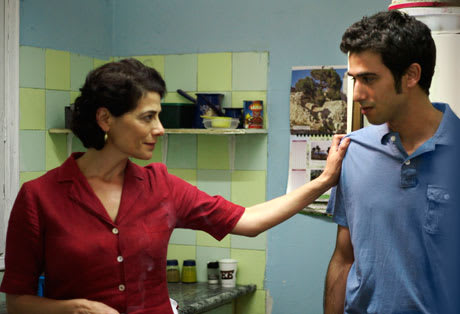According to the heavy-handed and exceedingly pedantic political love story, A Bottle in the Gaza Sea, every conflict, heartache and worldly injustice can be resolved by moving to France. It certainly would have helped Leonardo DiCaprio if he'd just moved there with Kate Winslet in Revolutionary Road and it seems to be the go-to destination for Kurdish criminals and refugees, so perhaps there's something to amalgamating cultures in the home of the baguette and Haute Couture.
Here, the romanticizing of France comes from two idealist youths that speak only in platitudes about the Israel-Palestine conflict. Tal (Agathe Bonitzer), a 17-year-old Israeli girl shaken by frequent café bombings, puts a note in a bottle―not in the Nicholas Sparks sense―asking the random recipient to send her an email to confirm receipt and share rudimentary political anecdotes.
Some time later, Naim (Mahmud Shalaby), a 20-year-old Palestinian boy shaken by the ongoing war, finds the bottle and reaches out via email with a few sarcastic bon mots and broad generalizations about Israeli soldiers. The pair spar it out for a bit, eventually learning to care for each other once they reach agreements about the nature of understanding a different perspective on a sticky situation.
This star-crossed lover dynamic inevitably results in familial and governmental squabbles, when third parties freak out about the impropriety of their pen pal exchanges, which is at least vital to the already strained narrative, unlike the juxtapositions of Tal partying on New Year's Eve while Naim sits alone, later lecturing her on different cultural celebrations.
Since the pair never shares the screen together, most of the film is told through clumsy voiceovers that say more about the twee leanings of the filmmakers than the characters on screen. Their discussions are always pointed outwards to commentate on the Israel-Palestine conflict, making the whole love story, or even the basic human angle, almost laughable. Worse is that this is compensated by extremely melodramatic music that tries to force emotion where there is none.
Somewhere in here is an interesting concept about the power of individual connection over collective beliefs, but it's buried under an oppressive amount of glibness and an overly strained, preachy didactic.
(Filmoption)Here, the romanticizing of France comes from two idealist youths that speak only in platitudes about the Israel-Palestine conflict. Tal (Agathe Bonitzer), a 17-year-old Israeli girl shaken by frequent café bombings, puts a note in a bottle―not in the Nicholas Sparks sense―asking the random recipient to send her an email to confirm receipt and share rudimentary political anecdotes.
Some time later, Naim (Mahmud Shalaby), a 20-year-old Palestinian boy shaken by the ongoing war, finds the bottle and reaches out via email with a few sarcastic bon mots and broad generalizations about Israeli soldiers. The pair spar it out for a bit, eventually learning to care for each other once they reach agreements about the nature of understanding a different perspective on a sticky situation.
This star-crossed lover dynamic inevitably results in familial and governmental squabbles, when third parties freak out about the impropriety of their pen pal exchanges, which is at least vital to the already strained narrative, unlike the juxtapositions of Tal partying on New Year's Eve while Naim sits alone, later lecturing her on different cultural celebrations.
Since the pair never shares the screen together, most of the film is told through clumsy voiceovers that say more about the twee leanings of the filmmakers than the characters on screen. Their discussions are always pointed outwards to commentate on the Israel-Palestine conflict, making the whole love story, or even the basic human angle, almost laughable. Worse is that this is compensated by extremely melodramatic music that tries to force emotion where there is none.
Somewhere in here is an interesting concept about the power of individual connection over collective beliefs, but it's buried under an oppressive amount of glibness and an overly strained, preachy didactic.




